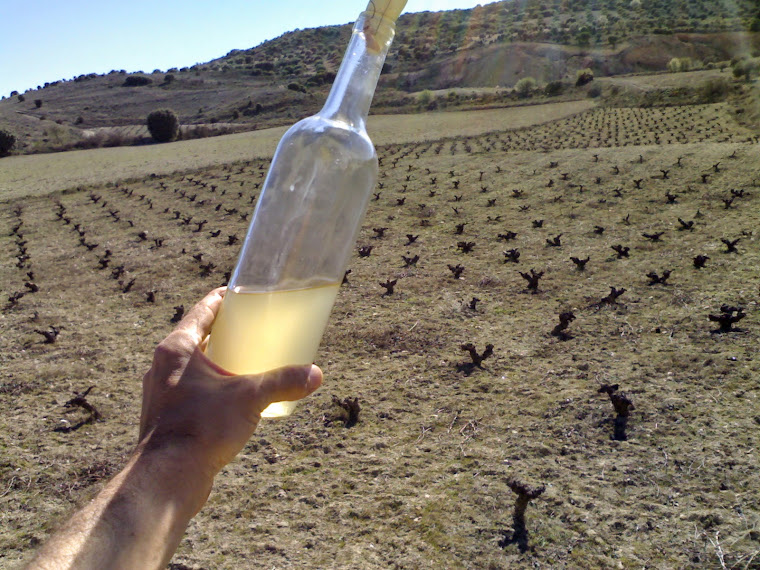Natural Wine
Nobody knows what it is!
Well, actually, quite a lot of people
know what it is. It’s just that there’s no legal or official definition. So
this can cause a lot of misunderstandings or even arguments.
This lack of a clear definition seems
to be a good thing for many mainstream press journalists and writers, as they can
just churn out the same old hackneyed topics time after time. I personally
haven’t read anything original in the last 4-5 years. Does that mean it’s all
been said then? Hey, maybe everything really has been said, and if I were to do
a bit of searching on the internet and make a summary of all the ‘takes’,
‘positions’, ‘postures’ and ‘stances’ on all the ‘issues’, ‘sound-bites’, ‘talking points’ and ‘philosophies’, I could
post a really comprehensive and definitive post, and there would be no reason
for anyone to bore anyone else with their unoriginal thoughts J.
Ach, if only I had the time to do
that!
Sadly (or rather, fortunately, for
you all!) I have far too many natural wine related tasks to be getting on with.
Apart from writing 2 posts/month (self-inflicted goal), I also have to grow
grapes, make wine, and thirdly sell said wine. Those three tasks
being the top-level of their particular multi-branched, multi-twigged,
multi-leafed tree.
A few months ago I was talking about
the definition of natural wine to a visitor to my vineyards, and I believe I
may have come up with an original sound-bite. I said “Natural wine is a bit
like pornography – it’s difficult to define but you know it when you see
it!” Well, it’s not totally original,
because someone really did say that – about pornography. But I’m claiming the
prize for saying it first about natural wine J
Anyway, in this post I’d just like to
repeat a message to all those writers and bloggers and commentators who insist
on saying things like “but it can’t be
‘natural’ because the vines are all planted in rows, and then pruned, and then
the grapes are crushed using machinery, etc, etc” you get the idea.
My message is: adjectives in English (in
fact most words in most languages) have many different meanings! This is so
blatantly obvious that that I’m left kind of speechless (or wordless!). Just
open up a dictionary and you’ll see. For example I just typed “online
dictionary” into Google and the first one on the list was http://www.dictionary.com/ and after
typing in “natural” I got 31 different meanings of the word natural.
Thirty-one! Obviously many of them are
pretty similar, but look at definition No.7:
having undergone little or no
processing and containing no chemical additives:
natural food;
natural ingredients.
That’s obviously the meaning that
natural winemakers, distributors and retailers are using when we write about
natural wines. Whereas the boring pedants who bore us all with their boring
utterances are sticking to definition No.1:
existing in or formed by nature
(opposed to artificial):
a natural bridge.
The same results come up for any
dictionary you care to consult. And it works for just about any word in the
English language!
Another message I have is this one:
Why don’t they all go and bore the pants off the producers, distributors and
retails of natural gas? There are many, many more consumers of natural gas than
there are of natural wine, and the gas industry moves vastly greater quantities
of money. And as if that weren’t enough reason, according to their meaning
No.1, natural gas is much, much more artificial than natural wine, as it
requires incredibly expensive and complex technology to produce the stuff! J
Having delivered my messages, I would
also like say why I believe that natural wines are ‘better’ in all possible
senses of the word than industrial-chemical-commodity-supermarket wines (ie
about 90% of the wines produced in the world today):
1.
Natural wines are better for the
environment. I don’t think there’s even any debate on this point, is there?
Industrial-chemical vineyards pollute the environment (groundwater, soil,
lifeforms, everything) even if they abide by the letter of the law.
2.
Natural wines are 100% risk-free in
terms of human health (final consumers and workers on the land and in
wineries). No debate there either,
surely?
3.
Thirdly, and this point is immensely
debatable, natural wines taste better, are more interesting, are expressive of
their terroir and grape variety, are more digestible, and generally just more
soul-raising and inspiring of joie-de-vivre! Not all natural wines are like
that, naturally! There will be some that are crap, but I’d say most of them are
like that. Just go to any natural wine fair and try to find a bad wine. This is
2017! Decades have passed since the latest modern natural wine renaissance. The
bad one have been weeded out and have disappeared.
Here's a couple of photos:
 |
| A worm |
Worms are a sign of a healthy, living
uncontaminated soil. You don’t see them in the 90% of agro-chemically exploited
vineyards. (I say ‘exploited’ and not ‘farmed’ because it’s an insult to
farmers to use the same verb to describe what the industry is doing to the
land).
 |
| My vineyard and the neighbour's vineyard |
Spot the difference. Which vineyard
is clean and alive and allows its vines to be healthy and vigorous and to produce healthy, balanced, complex and
delicious grapes? And which one is polluted and dead?




